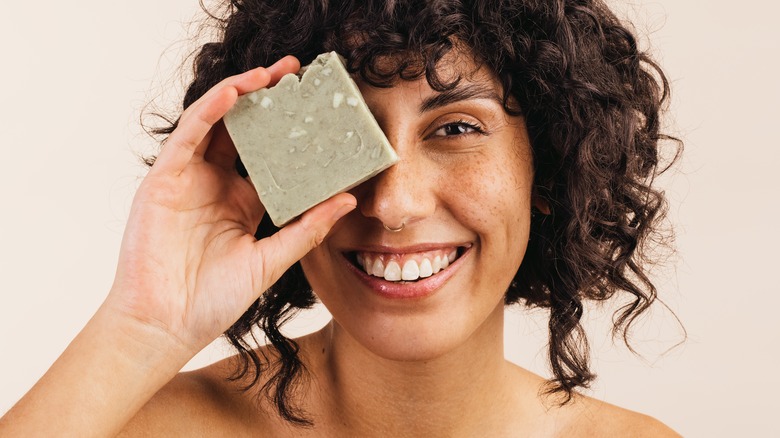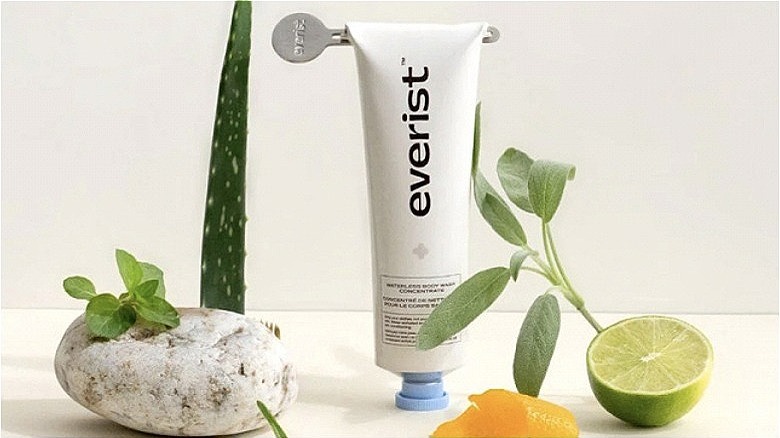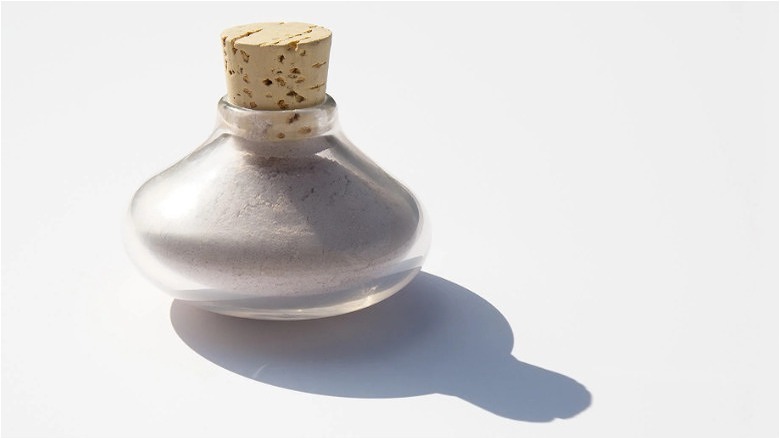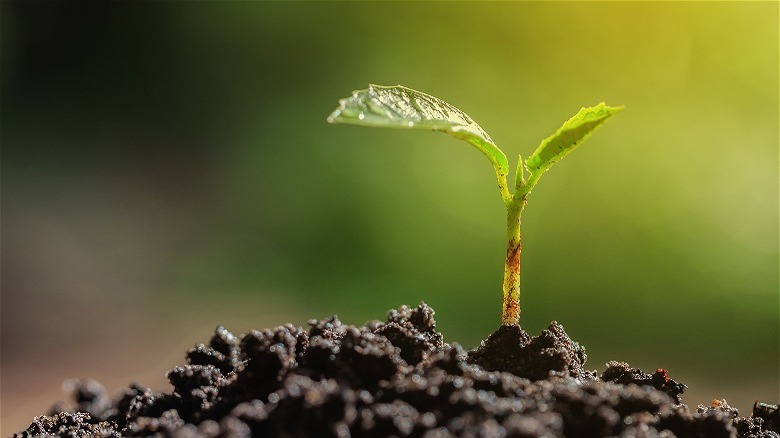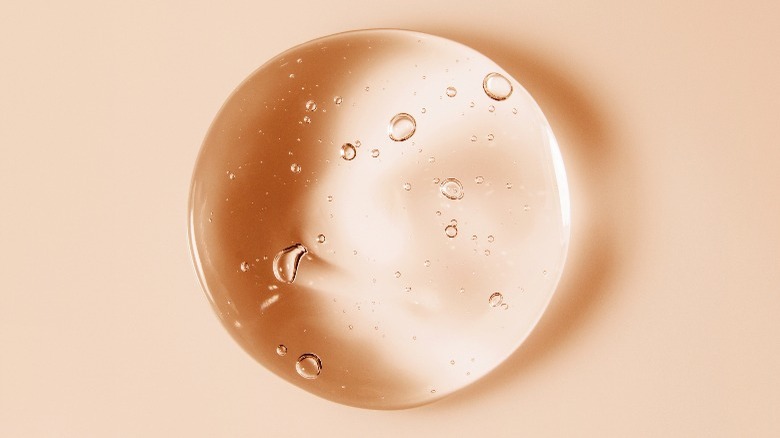All The Ways Waterless Beauty Empowers A Sustainable Lifestyle
We may receive a commission on purchases made from links.
For most makeup and skincare lovers, it might be hard to imagine removing products from our routines that contain water. After all, water is the primary ingredient in numerous cosmetics, often accounting for between 60% and 80% of a product's formula. On top of that, water-based makeup products can address various skin needs that other products, such as silicone-based products, cannot. For example, a water-based primer can moisturize sensitive skin, while a silicone-based primer controls oil as it sits on the surface of the skin.
But herein lies the conflict. Like a half-empty bag of potato chips blown up with air to appear larger, is all that water in our products simply diluting the good stuff to save companies cash?
A new trend of waterless beauty ascribes to the ethos that less water in your products means strengthened effectiveness. Originating in South Korea, the trend of waterless beauty promises not just more beauty for your buck, but also a sustainable new way to buy the products you use every day.
Higher product concentration
Waterless beauty promises that less water means a higher concentration of the good stuff, aka, the active skin-loving ingredients that you bought the product for in the first place! Products are often instead formulated with oils, extracts, and waxes in smaller overall proportions. From shampoos and conditioners, to blushes and lip balms, waterless beauty is a versatile trend with far-reaching implications.
Beauty brand Everist features a line of waterless, concentrated hair and body wash products that are activated with water in the shower. Its vegan and cruelty-free Waterless Body Wash Concentrate features three times the concentration of a standard body wash in a 100 milliliter aluminum tube, complete with a zero-waste tube key. Made with essential oils like orange peel oil, peppermint oil, bergamot oil, rosemary oil, and clary sage oil, this plant-based concentrate is also free of ingredients such as parabens and pthalates, silicones, and synthetic fragrances and preservatives. A pea-sized amount is all you need for one wash, so you'll get more mileage out of less product than you would with regular shampoo.
"Water-based products require high amounts of synthetic preservatives since water breeds bacteria," Tina Hedges, LOLI Beauty founder and CEO, explains to Forbes. "A water-free product, in most cases, can be preserved with more natural or earth-friendly preservatives," she says. Just keep in mind the importance of expiration dates on natural beauty products.
Less packaging
Between all of the bottles and containers, it's no secret that makeup requires a lot of packaging. Per Allure, in 2018, the beauty industry alone was responsible for billions of units in plastic waste, with much of it ending up in landfills. As you can imagine, none of that is great for our environment.
Waterless beauty offers a way to combat this. Because water takes up so much space in a product's container, removing it creates less physical volume, and ultimately requires less packaging.
"No water in formulas also means smaller packaging made of significantly fewer materials," Krysia Boinis, Vapour Beauty co-founder and CEO, tells Forbes. (Vapour Beauty has since closed its doors). And less packaging also means a more sustainable shipping experience, where lighter weight makes for a lighter carbon footprint.
Sustainable beauty brand Kindred Black features stunning skincare and beauty products often formulated with the use of oils instead of water. Its gorgeous Rose Clay cheek and lip stain is made with organic oils, including coconut oil, castor oil, Sonoran jojoba oil, and sweet orange essential oil, as well as sustainably sourced beeswax. The product also comes in handblown glass jars, which can be reused or kept as decor. Kindred Black also features powder face masks that are activated with water, including its Tepezcohuite Healing Mask, which features tepezcohuite root bark, colloidal oatmeal, and kaolin clay.
Emphasizes sustainable sourcing
The waterless beauty trend also places an emphasis on sustainable sourcing, though it can be tricky for consumers to gauge exactly how certain ingredients were grown and harvested. The issue has caused friction between two cosmetic camps: team natural ingredients, and team synthetic ingredients, where there are benefits and drawbacks to both methods of ingredient sourcing. Many products made with natural ingredients, for instance, consume a heavy amount of resources, from the plants used to make them to the energy expended to ship them.
Sustainable sourcing is relative, and comes down to the specific circumstances of the particular ingredient at hand.
"It is impossible to make such sweeping statements about an industry that uses vast quantities of resources; sometimes the natural ingredient will be more sustainable, sometimes the synthetic ingredient will be more sustainable. It depends entirely on what you're using and making," Lorraine Dallmeier, chemist and CEO of organic cosmetic formulation school Formula Botanica, tells The Zoe Report. When it comes to comparing the sustainability of ingredients, every detail counts, from materials and energy used in its genesis and growth, to byproducts created, its effect on the environment, its manufacturing costs, and much more, environmental engineer Dr. Tracy Fanara breaks down for The Zoe Report.
But, as Harpers Bazaar points out, waterless products are prompting brands to find ways to manufacture goods by using less of those resources overall. The publication noted one serum from True Skincare, for instance, sources from seaweed algae that doesn't require any water to extract.
Preserving finite resources
But of course, the waterless beauty trend would not exist if its goal was not to preserve our precious supply of fresh water. According to UNICEF, by 2025, half of the entire world population could potentially be living in places facing water scarcity, or not enough available fresh water to meet everyone's needs.
Because water is seen as a cheap base ingredient, it has come to be seen as expendable product instead of a rapidly decreasing, finite resource. According to a WGSN report, the water crisis is predicted to cause issues for the beauty industry. "Rising awareness of water quality and scarcity is inspiring consumers to demand products that use less water to make and use, while transparent supply chains will need to demonstrate that water supplies are treated with respect throughout production," according to the report.
Waterless beauty products are thus worthwhile products to try for those interested in a greener beauty routine, and thankfully, many brands are already making them available. From beauty bars and oils, to powdered cleansers, shampoo, and foundation, there are plenty of products on the market that can help people minimize their individual water consumption without sacrificing their love for beauty.
